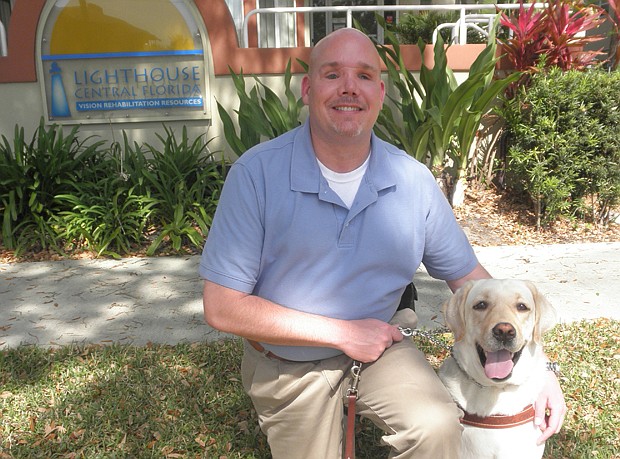- April 26, 2024
-
-
Loading

Loading

The cold air blasts across Steve Beres’ face as he speeds down the slope; his ski poles prick the firm snow, his skis gliding him through turn by turn – no bunny slopes for him. It’s all about the adrenaline rush, beating the hill, he says.
It’s the same for many athletes and adventure seekers. It’s about pushing limits. But when Beres pushes limits, like bungee jumping off the Stratosphere or riding out the most intense white water rapids for fun, there’s just one more element that changes his experience – he’s blind. But it doesn’t hold him back. He calls it more of an inconvenience than a disability.
“There’s really not much that you can’t do,” he said.
To learn more about Lighthouse Central Florida, visit lighthousecentralflorida.org. For more information about The Hadley School for the Blind, visit hadley.edu
So when Beres skis, there’s a guide right behind him telling him which way to dive and dodge through the snow. He was less frightened than his seeing counterparts as he took the plunge off the edge of the Stratosphere Tower in Las Vegas, and so were the group of blind veteran friends he took with him. He wants to show them what’s possible. It’s just one of the ways he contributes to a community he was suddenly thrown into 11 years ago.
Beres wasn’t always blind. The Winter Springs resident was in the Army and was a sergeant in the Milwaukee Police Department for years, when a terrible accident happened while he was on duty. His face, from his eyebrows to his top lip, was gone, now a gaping hole.
“I woke up that morning not knowing that I had seen my kids for the last time,” Beres said. “I went from perfectly sighted to totally blind in a millisecond.”
The doctors said he was lucky to be alive. And he could’ve been brain damaged, not able to be left alone with his children ever again, who were 2- and 4-years-old at the time of the accident. He felt like being blind, out of all those possibilities, was the best thing that could’ve happened to him.
“Being just blind isn’t all that bad,” he said. “Life is not over after you lose sight. It just changes.”
He knew he would either have to, as he puts it, hang from the rafters or move on. And he chose to move on, especially for his wife and now three children.
It was about two years, after many surgeries, that he felt like his life was getting back to normal. Looking for a reboot, he started taking classes online at The Hadley School for the Blind, which is a distance education school that helps educate those who are vision impaired and blind, their families, and blindness service providers.
He’s studied everything from learning to walk again with a cane, to using Excel and Word. In his first class he learned to use raised markers to label household items. He became more diligent with using his marker skills after he microwaved a can of crushed pineapple instead of soup for his kids. There’s nothing that tastes worse, he said with a laugh.
Now Beres has taken more than 100 classes, and was a member of the school’s focus group held to learn more about visually impaired veterans and their needs. Because of his dedication, Beres recently won the Outstanding Veteran Award from the school.
“His passion in life is service to his fellow mankind,” said Chuck Young, president of Hadley.
It was hard for Beres to let go of his life of service and that accompanying uniform. So he’s found new ways to help others in the blind community. He’s worked for the Department of Veteran Affairs in Michigan, and served as the adult rehabilitation service program manager for Lighthouse Central Florida – an Orlando organization that provides education, independent life skills and job training for those with sight impairment.
“He’s a person with a no excuse approach to life,” said Donna Esbensen, vice president and CFO for Lighthouse. “He has an inner compass that directs him … to be a statement of capability instead of disability.”
“It goes right to the heart of our clients,” said Lee Nasehi, president and CEO for Lighthouse.
Now, he’s an assistant vice president at Regions Bank and Service Member Civil Relief Act manager, helping to ease the financial and legal burdens of those in the military during active service. With 70 percent of blind people being unemployed, it’s another one of the many examples of how Beres has continued to beat the odds.
“I may have lost my sight, but I have never lost my vision,” he said.